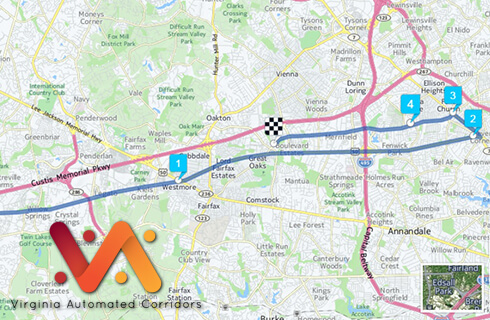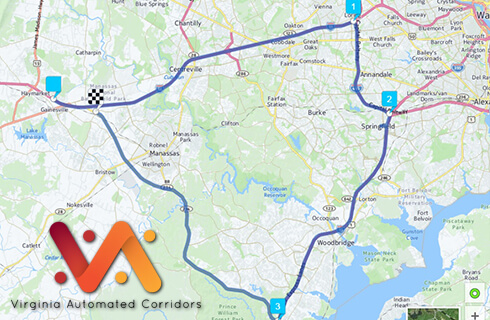
June 1, 2015
Blacksburg, Va., June 1, 2015 – A new initiative has been unveiled today that will revolutionize the development and deployment of automated vehicles: the Virginia Automated Corridors.
The Virginia Automated Corridors were established by the Virginia Tech Transportation Institute in partnership with the Virginia Department of Transportation; the Virginia Department of Motor Vehicles; Transurban; and HERE, a high-definition mapping business. This new initiative was created in answer to Virginia Governor Terry McAuliffe’s recent proclamation supporting the transportation institute in automated-vehicle research endeavors under the guidance of the Center for Automated Vehicle Systems.
The corridors feature more than 70 miles of interstates and arterials in the Northern Virginia region, including Interstates 66, 495, and 95, as well as U.S. 29 and 50. These roadways compose one of the most congested corridors in the U.S., with multiple transportation challenges that could be mitigated through the use of automation, including congestion. The corridors also include two test-track environments: the Virginia Smart Road, located on-site at the Virginia Tech Transportation Institute; and the Virginia International Raceway.
The Virginia Automated Corridors integrate a range of resources, including access to dedicated high-occupany toll lanes managed by Transurban along Interstates 495 and 95; high-definition mapping capabilities, real-time traffic and incidents, intelligent routing, and location cloud technology supported by HERE, which has worked with major automakers on previous automated-vehicle projects; pavement markings maintained by the Virginia Department of Transportation for completeness and retro-reflectivity; accurate localization via high-precision global navigation satellite systems; connected-vehicle capabilities enabled by dedicated short-range communications and cellular technology; access to sophisticated, unobtrusive data acquisition systems; and operations at higher speeds along a test track that features complex curves.
“Next-generation vehicle technologies can help transform our transportation system, from enhancing safety to supporting driver convenience,” said Tom Dingus, director of the Virginia Tech Transportation Institute. “Our goal with the Virginia Automated Corridors is to ensure automated-vehicle developers and suppliers have access to both a robust roadway environment and significant research support to create, test, and deploy systems that are beneficial to users.”
The Virginia Automated Corridors will help facilitate the use of state roads and test facilities for automated-vehicle testing, certification, and migration towards deployment. Automated-vehicle stakeholders testing in Virginia are not required to obtain a bond; licensing and insurance will be provided through the Commonwealth. The transportation institute will facilitate Institutional Review Board approval and certification for safe human research involvement.
The Virginia Tech Transportation Institute conducts research to save lives, time, money, and protect the environment. One of the seven university-level research institutes created by Virginia Tech to answer national challenges, the Virginia Tech Transportation Institute continually advances transportation through innovation and has impacted public policy on the national and international level.
Related Links
For more information, contact:
Pamela Stiff
540-231-1501
inquiries@vtti.vt.edu
